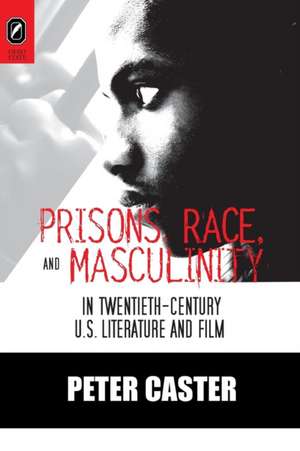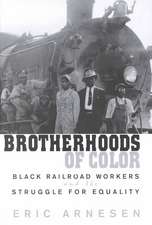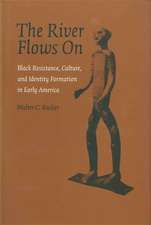Prisons, Race, and Masculinity in Twentieth-Century U.S. Literature and Film: Black Performance and Cultural Criticism
Autor Ph.D. Peter Casteren Limba Engleză Paperback – 28 mai 2015
In Prisons, Race, and Masculinity, Peter Caster demonstrates the centrality of imprisonment in American culture, illustrating how incarceration, an institution inseparable from race, has shaped and continues to shape U.S. history and literature in the starkest expression of what W. E. B. DuBois famously termed “the problem of the color line.”
A prison official in 1888 declared that it was the freeing of slaves that actually created prisons: “we had to establish means for their control. Hence came the penitentiary.” Such rampant racism co ntributed to the criminalization of black masculinity in the cultural imagination, shaping not only the identity of prisoners (collectively and individually) but also America’s national character. Caster analyzes the representations of imprisonment in books, films, and performances, alternating between history and fiction to describe how racism influenced imprisonment during the decline of lynching in the 1930s, the political radicalism in the late 1960s, and the unprecedented prison expansion through the 1980s and 1990s. Offering new interpretations of familiar works by William Faulkner, Eldridge Cleaver, and Norman Mailer, Caster also engages recent films such as American History X, The Hurricane, and The Farm: Life Inside Angola Prison alongside prison history chronicled in the transcripts of the American Correctional Association. This book offers a compelling account of how imprisonment has functioned as racial containment, a matter critical to U.S. history and literary study.
A prison official in 1888 declared that it was the freeing of slaves that actually created prisons: “we had to establish means for their control. Hence came the penitentiary.” Such rampant racism co ntributed to the criminalization of black masculinity in the cultural imagination, shaping not only the identity of prisoners (collectively and individually) but also America’s national character. Caster analyzes the representations of imprisonment in books, films, and performances, alternating between history and fiction to describe how racism influenced imprisonment during the decline of lynching in the 1930s, the political radicalism in the late 1960s, and the unprecedented prison expansion through the 1980s and 1990s. Offering new interpretations of familiar works by William Faulkner, Eldridge Cleaver, and Norman Mailer, Caster also engages recent films such as American History X, The Hurricane, and The Farm: Life Inside Angola Prison alongside prison history chronicled in the transcripts of the American Correctional Association. This book offers a compelling account of how imprisonment has functioned as racial containment, a matter critical to U.S. history and literary study.
Preț: 335.49 lei
Nou
Puncte Express: 503
Preț estimativ în valută:
64.22€ • 69.78$ • 53.98£
64.22€ • 69.78$ • 53.98£
Carte tipărită la comandă
Livrare economică 17-23 aprilie
Preluare comenzi: 021 569.72.76
Specificații
ISBN-13: 9780814252284
ISBN-10: 0814252281
Pagini: 304
Dimensiuni: 152 x 229 x 20 mm
Greutate: 0.45 kg
Ediția:1
Editura: Ohio State University Press
Colecția Ohio State University Press
Seria Black Performance and Cultural Criticism
ISBN-10: 0814252281
Pagini: 304
Dimensiuni: 152 x 229 x 20 mm
Greutate: 0.45 kg
Ediția:1
Editura: Ohio State University Press
Colecția Ohio State University Press
Seria Black Performance and Cultural Criticism
Recenzii
"Recognizing the centrality of the prison in American history and culture, Peter Caster adroitly explores complex interrelations between the actualities of incarceration and a wide-ranging sampling of their varied representations in the American imagination, zooming in on those always troublesome perceptions of race and masculinity. Caster’s ambitious project succeeds because he combines formidable scholarship with exceptionally insightful reading of texts as varied as Faulkner’s novels, Hollywood feature films, documentaries, and political discourse. Especially impressive are his nuanced juxtaposition of American History X with The Hurricane and his audacious crosscutting between readings of Eldridge Cleaver’s Soul on Ice and contemporaneous proceedings of the American Correctional Association.This is an unusually valuable contribution to our understanding of a crucial subject for contemporary America." —H. Bruce Franklin, author of Prison Literature in America: The Victim as Criminal and Artist and editor of Prison Writing in 20th-Century America
"Examining representations of crime and punishment on the page, on stage, and on screen, Peter Caster’s new book moves smartly from textual analysis (the sort of close reading no one seems willing to do anymore) to larger social and historical study, balancing with dexterity the texts and contexts of fictive representation and historical recollection. Prisons, Race, and Masculinity in Twentieth-Century U.S. Literature and Film offers significant insight into a modern American culture increasingly divided (and defined) by incarceration." —Jon Lewis, editor of Cinema Journal and author of Hollywood v. Hard Core: How the Struggle over Censorship Saved the Modern Film Industry
Notă biografică
Peter Caster is assistant professor of English at the University of South Carolina Upstate.































